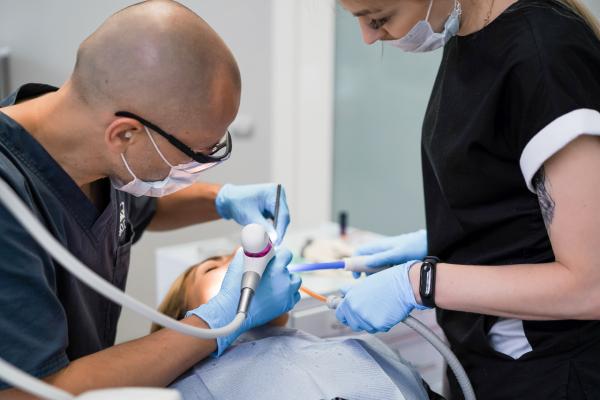In any healthcare setting, patient safety is paramount. Dental and orthodontal practices, often perceived as low-risk environments compared to hospitals, are no exception. While the primary focus is on oral health, dental practitioners also have a responsibility to ensure the overall well-being of their patients.
One crucial aspect of this is ensuring that all staff members are trained in Basic/Emergency First Aid and CPR, as well as Basic Life Support (BLS) First Aid. In Ireland, such onsite training is not just a recommendation but a vital component of patient care and workplace safety.
In this blog, we cover why onsite First Aid training should be a top priority for dental and orthodontal practices, how often it needs to be updated, and the key benefits it brings to both staff and patients.
The Role of Basic/Emergency First Aid and CPR in Dental Practices
Managing Medical Emergencies with Confidence
While dental and orthodontal practices are generally low-risk environments, medical emergencies can and do occur. Patients may experience unexpected complications such as allergic reactions to anaesthetics, fainting, or even cardiac arrest. In these critical moments, staff trained in Basic/Emergency First Aid and CPR are equipped to provide immediate, potentially life-saving care. The ability to administer CPR or use an automated external defibrillator (AED) swiftly and correctly can significantly increase a patient's chances of survival until emergency medical services arrive.
Responding to Common Incidents
Dental procedures often involve the use of sharp instruments, chemicals, and other equipment that can pose risks. Minor injuries, such as cuts, burns, or allergic reactions, are not uncommon. Staff with training in Basic/Emergency First Aid can quickly and effectively manage these incidents, preventing them from escalating and ensuring that the patient remains comfortable and safe throughout their treatment.
The Importance of Basic Life Support (BLS) First Aid
Advanced Response Capabilities
Basic Life Support (BLS) First Aid goes beyond the fundamentals of First Aid and CPR. It is specifically designed for healthcare providers, including dental and orthodontal professionals, who may need to respond to more complex medical emergencies. BLS training includes the management of airway obstructions, recognition and response to cardiac arrest, and the use of advanced resuscitation techniques. This level of preparedness is essential in a dental practice, where quick, precise actions can save lives.
Enhancing Team Coordination
BLS training is often conducted as a team-based course, which helps to improve coordination among staff members during an emergency. In a dental practice, where several professionals may need to work together to manage a patient crisis, having a team that is trained to respond cohesively can make a critical difference. This not only improves patient outcomes but also instils confidence in the staff, knowing they can rely on each other in high-pressure situations.
Frequency of Training and Refresher Courses
First Aid skills must be kept current to remain effective. In Ireland, it is recommended that staff undergo refresher training every two years to maintain their certification in Basic/Emergency First Aid and CPR, as well as BLS First Aid. Medical guidelines and best practices evolve, and regular training ensures that your staff is up-to-date with the latest protocols and techniques. Moreover, skills can degrade over time if not regularly practised, so these refresher courses are essential to keeping everyone’s skills sharp.
Additional Considerations for Dental and Orthodontal Practices
Legal and Ethical Obligations
Dental practitioners in Ireland have a legal duty to ensure the safety of their patients. Failing to provide adequate first aid training for staff not only risks patient safety but could also lead to legal repercussions and damage to the practice’s reputation. By ensuring that your team is trained in both Basic/Emergency First Aid and BLS, you are fulfilling your ethical and legal responsibilities.
Creating a Culture of Safety
A well-trained staff contributes to a culture of safety within the practice. When everyone is prepared to respond to emergencies, it creates an environment where patients feel secure, and staff members are confident in their ability to handle any situation. This culture of safety is a strong foundation for providing high-quality patient care.
Partnering with SafeHands Health & Safety Solutions
Investing in comprehensive onsite First Aid training is an essential part of maintaining a safe and professional dental or orthodontal practice. Whether it’s Basic/Emergency First Aid and CPR, or Basic Life Support (BLS) First Aid, ensuring that your team is prepared for any situation is crucial for the safety and well-being of your patients.
SafeHands Health & Safety Solutions offers a tailored training programme designed specifically for dental and orthodontal practices in Ireland. Our First Aid for Dental Practices course covers all aspects of First Aid, including CPR, BLS, and the unique risks associated with dental care. By choosing SafeHands, you ensure that your practice not only meets legal requirements but also sets the highest standards for patient safety and care.
So if it's time to refresh your dental or orthodontal practice's onsite First Aid training, give us a call on 01-7979836 or 0873823223, email info@safehands.ie or visit safehands.ie.
Photo provided by Freepik

